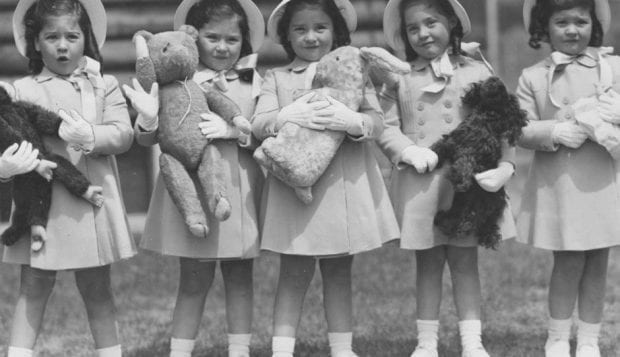By Elof Axel Carlson

Cloning is a fancy word for making identical twins. Another fancy word is calling twins monozygotic, meaning that the two (or more) identical twins arose from a single fertilization of an egg that produced a mass of cells that split into two or more batches of cells, each batch forming an individual.
The Dionne sisters in Canada (five of them) were the most famous set of identical twins. Artificial cloning, or making twins in animals, began with the work of Hans Driesch in the 1890s. He used sea urchins to separate cells after fertilization, and the individual cells became identical twins.
A more surprising technique was developed by Robert Briggs and Thomas King in the 1950s; they used cell nuclei from early embryos to insert into enucleated eggs and make clones of frogs.
Ian Wilmut made Dolly in 1996, the first cloned sheep from a cell nucleus taken from the breast of an adult female sheep. Since then lots of animals have been cloned, including pet dogs and cats.
The leaders in this effort to commercialize animal cloning have been South Korea and China. China has now taken the lead of combining gene editing (replacing one gene with another by microsurgical techniques called CRISPR-9). They believe this will change how research in human diseases will be done. They cloned a beagle after editing one of its donor cells to produce a medical condition of a form of blood vessel damage that leads to heart attacks and strokes.
The arguments for this are based on human welfare. By having a healthy dog as a control and its altered clone with the culprit gene to be followed in the course of disease, they have dogs differing in only one known gene. They can try methods to regulate that gene, isolate its gene product or functions as it creates a disease later in that dog or they can try using agents that might block the gene from acting or block the product of the inserted gene so it does not lead to heart disease or strokes.
Some people feel medical experimentation should never be done on animals, only on consenting humans. Some feel it is cruel to be created not as a loved pet but as a “thing” to be used in research. Much of human conflict has been based not on conflicts of good versus evil but on the perceived goods of one faction against the perceived goods of a different faction.
I suspect that American (and some other countries) pharmaceutical companies wanting to avoid legislation banning animal cloning will just have that research done in China or other countries that do not recognize the rights of animals.
Living with contradictions is part of being human. We claim “thou shall not kill” is mandated to us, but we allow killing by intent in war, self-defense, execution of condemned prisoners and by neglect (low wages and a government that assumes health is a private matter and not the responsibility of government beneficence).
We could do the same with “thou shall not covet” and apply it to making money. Are not billionaires coveting money when they use lobbyists to change inheritance tax laws and place their money where it cannot be taxed and is shielded by legal loopholes?
The combination of gene editing and artificial cloning by nuclear transplantation will have major benefits in medicine for those diseases that have identified genes. For single gene defects this is about 2000 known birth defects and other conditions most parents would not wish to have afflicted on their children.
If humans do not prevent diseases by medical research, nature will take its toll in reaping the sick and disabled as it did for centuries until the era of modern medicine began with the germ theory, public health movements and the shift of medicine from an art to a science.
I much prefer having had my cataracts removed so I can now drive without eyeglasses than to find myself unable to read books and articles or be a menace on the road.
Elof Axel Carlson is a distinguished teaching professor emeritus in the Department of Biochemistry and Cell Biology at Stony Brook University.





